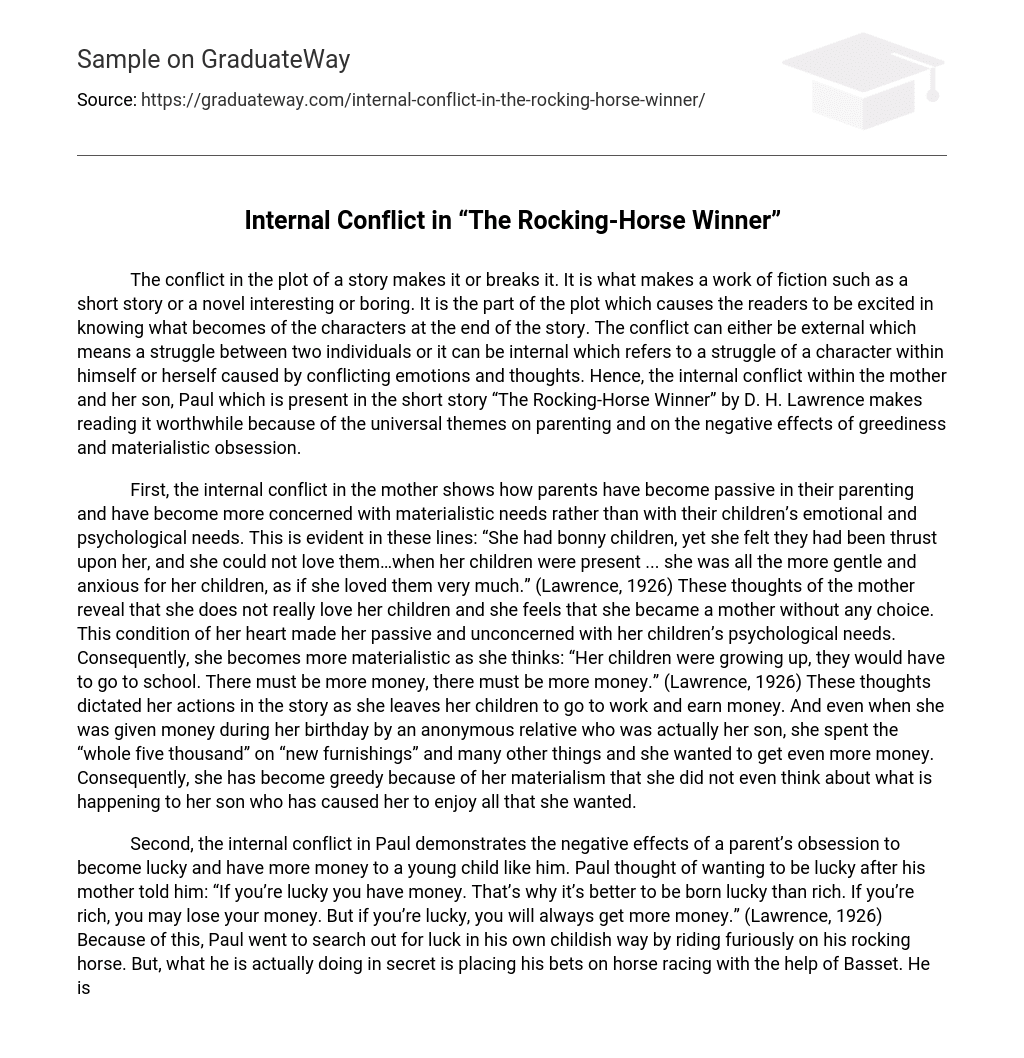The conflict in the plot of a story makes it or breaks it. It is what makes a work of fiction such as a short story or a novel interesting or boring. It is the part of the plot which causes the readers to be excited in knowing what becomes of the characters at the end of the story. The conflict can either be external which means a struggle between two individuals or it can be internal which refers to a struggle of a character within himself or herself caused by conflicting emotions and thoughts. Hence, the internal conflict within the mother and her son, Paul which is present in the short story “The Rocking-Horse Winner” by D. H. Lawrence makes reading it worthwhile because of the universal themes on parenting and on the negative effects of greediness and materialistic obsession.
First, the internal conflict in the mother shows how parents have become passive in their parenting and have become more concerned with materialistic needs rather than with their children’s emotional and psychological needs. This is evident in these lines: “She had bonny children, yet she felt they had been thrust upon her, and she could not love them…when her children were present … she was all the more gentle and anxious for her children, as if she loved them very much.” (Lawrence, 1926) These thoughts of the mother reveal that she does not really love her children and she feels that she became a mother without any choice. This condition of her heart made her passive and unconcerned with her children’s psychological needs. Consequently, she becomes more materialistic as she thinks: “Her children were growing up, they would have to go to school. There must be more money, there must be more money.” (Lawrence, 1926) These thoughts dictated her actions in the story as she leaves her children to go to work and earn money. And even when she was given money during her birthday by an anonymous relative who was actually her son, she spent the “whole five thousand” on “new furnishings” and many other things and she wanted to get even more money. Consequently, she has become greedy because of her materialism that she did not even think about what is happening to her son who has caused her to enjoy all that she wanted.
Second, the internal conflict in Paul demonstrates the negative effects of a parent’s obsession to become lucky and have more money to a young child like him. Paul thought of wanting to be lucky after his mother told him: “If you’re lucky you have money. That’s why it’s better to be born lucky than rich. If you’re rich, you may lose your money. But if you’re lucky, you will always get more money.” (Lawrence, 1926) Because of this, Paul went to search out for luck in his own childish way by riding furiously on his rocking horse. But, what he is actually doing in secret is placing his bets on horse racing with the help of Basset. He is able to get thousands of pounds yet he wanted to get more money from gambling when he heard “the voices in the house… There must be more money!.. Now-w-w- there must be more money! – more than ever!” (Lawrence, 1926) This made him try harder “to get to know” what horse will win in the races until he becomes “wide-eyed”. Eventually, this obsession caused him to ride furiously in his rocking-horse one night which caused his illness and his death. Thus, his parents’ passive concern and materialistic obsession lead to his obsession in gambling and his death.
In conclusion, the struggles and internal conflict of each character such as the mother and Paul are unsaid and unknown yet these conflicting thoughts and feelings manifested through each character’s actions that somehow affected one another. Hence, it is the internal conflict of the characters that creates the development and progress of the story. It is what makes the characters do what they do in the story which leads to the ending. The internal conflict also revealed to the readers the recurring themes of the importance of parenting and the negative effects of greed and materialism. Indeed, it is conflict that makes or breaks the story.
Works Cited
Lawrence, D.H. “The Rocking-Horse Winner”. Geocities. 22 February 2004. 21 July 2008. <http://www.geocities.com/short_stories_page/lawrencerockinghorse.html>





